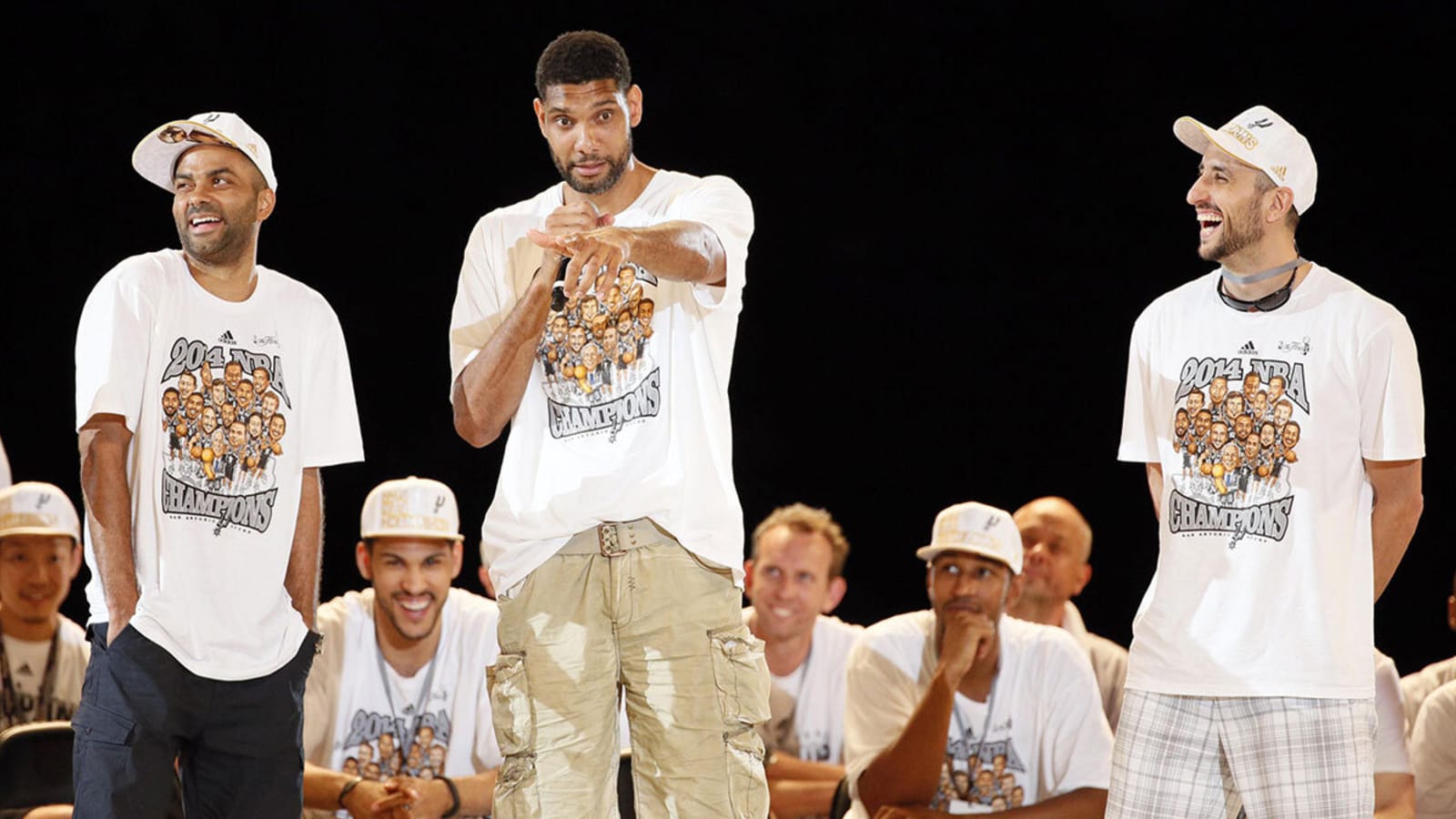
There have been no shortage of brilliant players to walk through the doors of the San Antonio Spurs. That’s no surprise. Since entering the NBA, they’ve made the playoffs in 38 of 47 seasons, won five championships, and have the best overall record in the league.
The Spurs are currently in the longest playoff drought in franchise history, but the hope is that Victor Wembanyama will someday be high on this list as he leads the Spurs back to prominence.
For decades, there was something intangible about the Spurs that makes them better than the sum of their parts, but nonetheless, there have still been plenty of pretty handy pieces making up their teams.
From some of their early stars like George Gervin and James Silas to their Big Three which led them to three championships in the early parts of this century, these are the 10 greatest Spurs players in franchise history, ranked.
10. Alvin Robertson
Though he only played for the team for five years, Alvin Robertson certainly lived up to the expectations the Spurs had for him when they selected him with the seventh pick in the 1984 NBA draft.
In those five seasons, he developed into one of the most dangerous defenders in the league, as demonstrated by his consistent presence in the All-Defensive First and Second Teams, and his NBA Defensive Player of the Year Award in 1986.
But a defender isn’t all he was. Robertson averaged close to 20 points and six assists every season with the Spurs except for his first and was a three-time All-Star during his time with the team.
9. Larry Kenon
Larry Kenon spent the back half of the ’70s with the Spurs after a couple of years with the Detroit Pistons to start his career, in that time establishing himself as a consistent force around the rim during a period in which the Spurs won close to 50 games virtually every season.
He averaged at least 18.7 points every season with the team on efficient shooting to go with around ten boards and three or four assists, before moving to Chicago in 1980. Thereafter, however, his production decreased drastically, and by the end of his career his five seasons in San Antonio stood out as comfortably his best period.
8. Bruce Bowen
Bruce Bowen’s numbers don’t exactly leap off the page. After moving to San Antonio in his sixth season in the NBA, he played there for eight years and never averaged more than 8.2 points, 3.9 rebounds or 1.5 assists.
But if ever there was evidence that stats don’t tell the whole story, Bruce Bowen’s career with the Spurs is it. He was a key piece in the team that won three championships in the early part of the century, and eight consecutive NBA All-Defensive teams were testament to just how significant his impact was.
7. James Silas
The Spurs never won a championship during James Silas’ tenure with the team, but that didn’t stop him from leaving an indelible mark on the organization for whom he played for nine seasons. Silas’ best season came in 1975-76 when he averaged 23.8 points (on 51.9% shooting no less), 4.0 rebounds, 5.8 assists and 1.8 steals per game.
He was selected to the All-ABA First Team that year and was also an All-Star, a feat he also managed the year before. He finds himself sixth in total points for the Spurs and eighth in total assists, and had his jersey retired by the franchise in 1984.
6. Kawhi Leonard

Kawhi Leonard has been maligned at times for his inability and at times apparent unwillingness to stay on the court, and his tenure in San Antonio didn’t exactly end harmoniously. But to focus on that is to ignore what a brilliant player he was for the team, and the pivotal role he played in bringing the franchise its fifth championship.
Leonard spent the first seven years of his NBA life with the Spurs, gradually developing into one of the best players in the league, and in just his third season in the league won the Finals MVP en route to his first championship.
Within a couple of years he was averaging more than 25 points while also being one of the best defenders in the league, and though his career with the Spurs came to an end after he spent the bulk of the 2017-18 season on the sideline, the impact he had on the organization is impossible to deny.
5. Manu Ginobili
The Spurs’ team of the early parts of this century was one of the most stable and successful in league history, and Manu Ginobili was one of the major reasons why. Few players spend 16 seasons in the league, and a hell of a lot fewer than that spend them all on one team, but that’s exactly what Ginobili did, developing into probably the greatest sixth man of all time along the way.
He sits behind only a couple of his longtime teammates in total games played for the franchise, while he’s fifth in total points, fifth in total rebounds, fourth in total assists, and first in total steals.
4. Tony Parker
It’s hard to discuss Ginobili’s career without mentioning Tony Parker, who the Spurs drafted one year prior and spent the next 17 years of his life there, racking up four championships, six All-Star appearances and a Finals MVP along the way.
Few could have predicted the impact he would have on the franchise when he was selected with the 28th pick in the 2001 draft, consistently averaging close to 20 points and six or seven assists during his illustrious career. Like Ginobili, his mitts are all over the Spurs’ all-time leaders in a bunch of categories. He’s second in games played, fourth in points, and leads assists by a mile.
3. George Gervin
George Gervin moved to the Spurs during the 1973-74 season having established himself as an elite scorer in the ABA, and he well and truly lived up to that reputation during the next decade or so in San Antonio. At the height of his career, he was nearly impossible to stop, and the four consecutive scoring titles he won were testament to that.
In 899 games for the Spurs, he became their second-leading scorer of all time, was a nine-time All-Star, and made five consecutive All-NBA First Teams. Not a bad record at all.
2. David Robinson
David Robinson is yet another star who spent his entire NBA life with the Spurs, having played there in all 14 seasons of his career, and what a career it was.
Robinson’s list of accolades speaks for itself; he won the MVP in 1995, was a 10-time All-Star, four times made the All-NBA First Team, four-time member of the All-Defensive First Team, won the Defensive Player of the Year Award in 1992, won a couple of championships – you get the point.
He was for a long time one of the absolute best of the best in the league, and having spent the entirety of that illustrious career with the one team it’s little surprise that he is widely accepted to be one of the absolute greats of that franchise.
For many other franchises, a career as prolific as his would have him sitting No. 1 by some margin, but he’s got some pretty hefty competition from the Big Fundamental.
1. Tim Duncan
Basketball isn’t easy, but nobody seems to have told Tim Duncan that. From the moment he entered the league he made playing NBA look like shelling peas, averaging more than 21 points and 11 rebounds in his first season – numbers he would maintain for each of his first six seasons in the league and rarely dipping below it for over a decade.
His 19-year career with the Spurs was right up there with the greatest of all time. He ended it a two-time league MVP, three-time Finals MVP, five-time NBA champion, 15-time All-Star, 10-time member of the All-NBA First Team, eight-time member of the All-Defensive First Team, and the list goes on.
One of the most reliable and unstoppable players in history at both ends of the floor, he leads the franchise in total points and rebounds and is unequivocally deserving of his spot as the greatest ever player for one of the NBA’s most successful franchises.
More must-reads:
- Top storylines for each Western Conference play-in series
- Suns make decision on head coach Mike Budenholzer
- The 'NBA's points-per-game leaders from 2015-16' quiz
Breaking News
Customize Your Newsletter
 +
+
Get the latest news and rumors, customized to your favorite sports and teams. Emailed daily. Always free!
